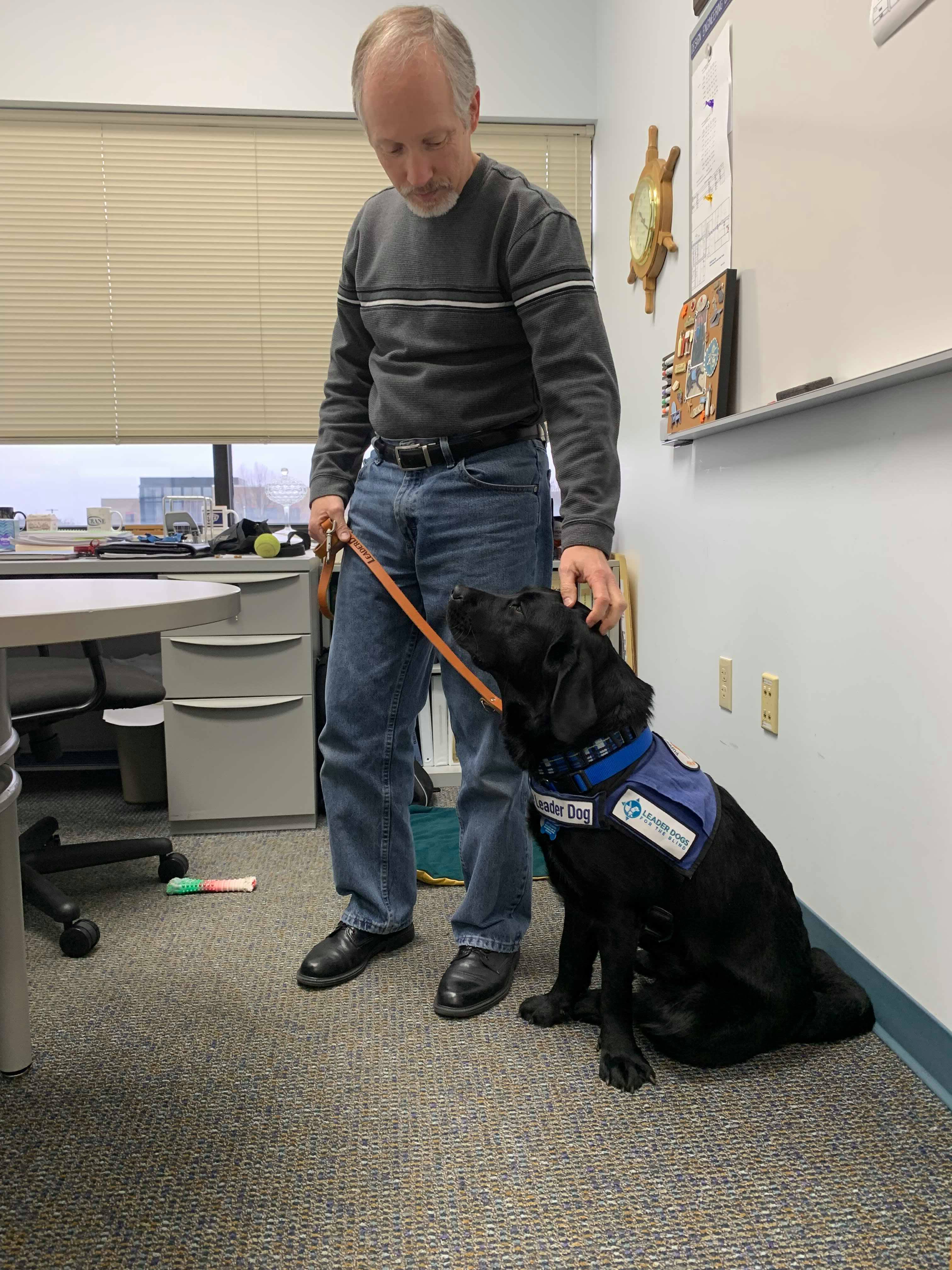
Jeff Schafer and Leader Dog Ellie
Brought to you by WBIW News and Network Indiana
Last updated on Wednesday, December 19, 2018
(CRANE) - If you step inside Jeff Schafer’s office, you’ll see an assortment of things you might expect, like a coffee mug and a computer. You may not have anticipated, or even noticed, a service dog-in-training to be lying patiently by Schafer’s feet.
Schafer, a Branch Manager at Naval Surface Warfare Center, Crane Division (NSWC Crane), ensures the development of the design engineering workforce. Schafer has served nearly 39 years for the U.S. Navy, both as a sailor and as an NSWC Crane federal civilian. For the past six years, he has volunteered to be a puppy raiser for Leader Dogs for the Blind (LDFB). LDFB is one of the largest service dog organizations for the blind and the only one for blind-deaf clients.

Jeff Schafer and Leader Dog Ellie
"I train puppies obedience and social skills from the time they are eight weeks to about 12 months old," says Schafer. "Then these dogs go to LDFB for specified training, focusing on activities and behaviors desirable for service dogs for the blind or blind-deaf. There is a 55 percent success rate for puppies to be selected for a blind client and less than ten percent rate in being selected for blind-deaf clients."
Schafer has trained five puppies since joining the program and is currently on his sixth. Two puppies he trained were selected to be Leader Dog Moms to breed service dogs, one is working in Georgia with a blind client, one is now a therapy dog that has made 175 visits to various locations like nursing homes, schools, and universities.
"When the dog is wearing its uniform, it knows it has a job to do; its job is to protect its client. The dogs are calm, quiet, and can easily go unnoticed by the public," says Schafer. "When the service-dog uniform is off, the dog acts like a regular dog."
The cost of service dogs can be more than forty thousand dollars, but through LDFB, clients receive service dogs completely free of charge. He says trainers have the opportunity to say goodbye to each dog when they meet the client for the first time.
"These dogs change clients' lives," says Schafer, "It is hard to say goodbye, but I know I helped train these dogs and to serve a higher purpose for someone else."
Schafer's fourth puppy he trained, named Thor, was one of the few dogs matched with a client who is both blind and deaf. Due to these circumstances, this client was dependent on other people. Schafer says seeing Thor paired with someone who needed it is rewarding.
"Thor gave his client independence," says Schafer. "Thor allows the client to go to and from work. He protects him and doesn't let him go the wrong way. This truly is a game-changer for all of the clients; it totally changes their lives and perspective."
At NSWC Crane, Schafer ensures microchips can endure the diverse and rigorous conditions the fleet faces. He makes sure his team has the tasking and tools they need to succeed in design engineering to solve current and future warfighter technical problems.
NSWC Crane is a naval laboratory and a field activity of Naval Sea Systems Command (NAVSEA) with mission areas in Expeditionary Warfare, Strategic Missions and Electronic Warfare. The warfare center is responsible for multi-domain, multispectral, full life-cycle support of technologies and systems enhancing capability to today's Warfighter.
1340 AM WBIW welcomes comments and suggestions by calling 812.277.1340 during normal business hours or by email at comments@wbiw.com
© Ad-Venture Media, Inc. All Rights Reserved.